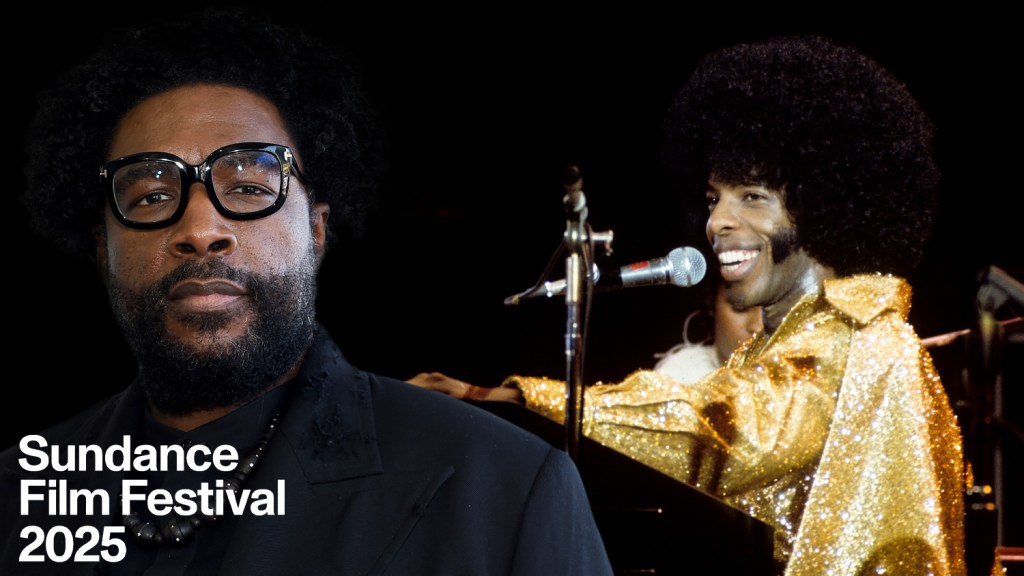The first time Ahmir “Questlove” Thompson had a film at the Sundance Film Festival, The Roots co-founder never got to share it with a live audience due to the Covid lockdown that saw the 2021 gathering go virtual only. Tonight, with the 9:30 p.m. MT premiere of Sly Lives! (aka The Burden of Black Genius) at Park City’s sure to be sold out Eccles Theatre, it’s going to be a whole new Sundance for the Summer of Soul director and Academy Award winner.
And not just because Queatlove is widely expected to put his headphones on and spin some tracks for a dancing crowd this weekend in the Utah resort town. It’s a whole new Sundance, because, turns out the trailblazing life, music and legacy of the now 81-year-old Sly Stone has permeated across many aspects and avenues of multitasker Questlove‘s own life and work.
“Even now, as Tariq and I are towards the end of creating this new Roots album, ‘The End Game,’ the osmosis effect has started now,” the band leader admits of of the upcoming release of a new album with long time collaborator Tariq “Black Thought” Trotter. Full of often astonishing footage and sounds of the ‘Family Affair’ superstar and his band in their heyday, Sly Lives! is also packed with interviews with the Family Stones creative offspring like Outkast’s Andre 3000, George Clinton, D’Angelo, Chaka Khan, Tribe Called Quest’s Q-Tip, family members, and more.
Sly Lives! is, however, built as something much more ambitious than a trip down memory lane. .
“Because my whole thing is that Sly’s biggest legacy is he’s the first domino to fall in a long line of artists that somehow will wind up sort of sabotage themselves,” Questlove says of the larger picture of his big screen effort from producers Joseph Patel and Derik Murray launches on Hulu on February 13 after its four screenings at Sundance.
Between Sly Lives! promotion here in Park City, bandleader on The Tonight Show starring Jimmy Fallon, running a book imprint, tours and more, Questlove career as a filmmaker is growing in classic Sundance fashion. There’s the just started film about the legendary Earth Wind & Fire, and, as a part of Saturday Night Live‘s 50th anniversary celebrations, there’s the Oz Rodriguez co-directed Ladies & Gentlemen … 50 Years of SNL Music hitting NBC on January 27, with a drop on Peacock 24 hours later.
In Park City straight from NYC, Questlove spoke with me to discuss Sly Lives! (aka The Burden of Black Genius), and how making the film changed him and his music. The Grammy winner also reveals some of what happened to him after the 2022 Oscars and that on-stage slap of Chris Rock by Will Smith, the hard choices of juggling multiple products, and some self-awareness lessons learned.
DEADLINE: I want to read something to you from a book you might recognize, because you wrote it, ‘Hip Hop Is History’: “Big stars helped forge attitudes and philosophies, but others poured concrete for a foundation.” Maybe it’s me, but that sure sounds like it could be the subtext tagline for Sly Lives!, don’t you think?
AHMIR “QUESTLOVE” THOMPSON: You know, there’s a statement at the end of the film in which it said that Sly organized the alphabet, from which we’re still writing books and chapters, creatively speaking. My belief is that oftentimes, the pioneer never gets the credit they deserve. It’s always the person that comes in second. Sly is one of the first rare situations in which he was a pioneer that was actually briefly able to kind of live off the fruits of the land, if you will.
And you know, his undoing is, you know, kind of at his own hands, which is really the, I guess, the point of this whole film about self-sabotage. But, yeah, he wrote the alphabet, and, you know, we’re still writing books from that alphabet to this day.
DEADLINE: Why did you not interview Sly directly, and instead lean on a trio of extensive past interviews, like the hard hitting one by then newbie journalist Maria Shriver?
QUESTLOVE: You know, we kind of had to micro-build this story. It’s not just a Sly Stone story. This is every artist that I’ve ever worked with.
DEADLINE: How do you mean?
QUESTLOVE: Alright (PAUSE) So, it’s kind of funny, you can see the exact moment when D’Angelo himself realizes, like, I’m not here to talk about ‘Everyday People,” right? Because my whole thing is that Sly’s biggest legacy is he’s the first domino to fall in a long line of artists that somehow will wind up sort of sabotage themselves.
DEADLINE: How does that play out for you, with all the stories and myths about Sly?
QUESTLOVE: When I first started this film, I asked my mom, asked people like, what do you think happened to Sly Stone? They all say the same thing – you know, he ran with the wrong crowd and got involved in drugs. But drugs is never just a choice. Drugs are a coping mechanism to cover up for something else. Some people use drugs. I was food. There’s drinking, shooting, sniffing, drugging, overworking, self-destruction, tattoos, piercings ..
DEADLINE: This sounds like a lot of my former life …
QUESTLOVE: Well, yeah, because it’s real like that, isn’t it? Which is why, for me, the hardest part of the story were finding testimonials, Andre 3000 was the only one with glee that expressed and saw what this was.
DEADLINE: Which was?
QUESTLOVE: That this was a therapeutic way for hiom to let people know why I walked away from this 20 years ago. When we were talking, I said, dude, you went Diamond with Outkast, you were literally on top of the world, like the world was at your oyster, and your answer was to walk away from it all. His thing was had I stayed, this, what happened to Sly, would have been my fate.
DEADLINE: This really isn’t just about Sly Stone …
QUESTLOVE: Not at all. For me, I always dreamt of maybe having a intervention talk with a few of my peers, or I felt like this was my chance to do that. I think now more than ever, we need clear minded artists to really step up to the plate – especially where we are right now.
DEADLINE: To the right now, Sly Lives! debuts in Park City on Sundance 2025’s opening night, then heads to Hulu next month. So, as your second film as a director and with what you just said, I want to ask you a question that I asked when Summer of Soul came out: How has making Sly Lives! affected you as an artist, as an individual?
QUESTLOVE: This was a doozy. I said jokingly that I had to get a second therapist, but that’s actually the truth. It made me do a lot of self-reflecting, and to take in people’s pain. You know, this was two and a half years of making this. This definitely made me more aware and improve myself as a band leader, as a business partner, as especially as a human.
DEADLINE: How did that manifest itself?
QUESTLOVE: Okay, how do you feel right now? Like, do you really need to eat the sandwich at four in the morning, is there something that you’re, you’re running away from, and that, like a lot of self-analytical things. Also, I foolishly, and I don’t recommend this to anybody, never work on three projects at the same time. The emotional weight of the Earth, Wind & Fire, story and the Sly story is the reason why my SNL doc is such jovial fun.
DEADLINE: We’ve got to go there, so ….
QUESTLOVE: (LAUGHS) . Because it was like, God damn, I can’t wait to get to Friday.
DEADLINE: Friday? Like thank TGIF?
QUESTLOVE: Kinda. See, Friday, Saturday, Sunday, I’d just work on my SNL doc thing. First it was just going to be like a normal ass clip thing here, here’s the 50 best performances. And you know, people were like, wait a minute, like, we didn’t know you were doing this. And I think I had to make SNL my fun playground, just to let the pain of the Sly story get to me.
DEADLINE: That’s a deadly balancing act, no? More therapy?
QUESTLOVE: Two years into it, I was just like, damn man. Even telling Sly’s story, I realized no one can come in this guy’s sphere without getting dirt on them – even me as a filmmaker. I’m so glad it’s over now, and I’m glad that people received it, but this affected me greatly. This made me clock in so many hours with my therapist to make extra sure that I don’t fall down that rabbit hole,
DEADLINE: But, just from what I know of the vast archives, tapes and other material that was made available, you had to go deep to even skim the surface of Sly, right?
QUESTLOVE: Dude! So many gems we had to leave behind, so many stories, music. My first cut was like three hours and 15-minutes. It was like somebody just led us into the dungeon, and, so we spent about a good year and a half just listening to, you know, the entire ‘A Whole New Thing’ sessions, the entire ‘Dance to the Music’ session. So, like, in ‘A Whole New Thing,’ they always kept the tape rolling, so you kind of get to hear Sly break a lot of rules.
DEADLINE: Sly even acknowledged rules?
QUESTLOVE: Let me tell you this story about ‘Fresh.’
DEADLINE: Okay
QUESTLOVE: So, to me, ‘Fresh’ is a perfect album because of its stripped down, bare funk, but it started off the complete opposite.
There’s one point, where my guess is that perhaps he was auditioning drummers at the same time, and they do a version of ‘Babies Making Babies.’ It’s not like the song you hear on Fresh. t’s almost like a, what I call an African assault army. There’s four drummers playing at the same time, and it’s just the loudest assault. It’s almost like if Public Enemy made ‘A Nation of Millions’ back in 1973.

The Roots performed at an Election Eve rally held at the Philadelphia Museum of Art on November 4, 2024. (Photo by Kyle Mazza/Anadolu via Getty Images)
DEADLINE: So, how has all that seeped into The Roots, if it actually has?
QUESTLOVE: It has, yes. Even now, as Tariq and I are towards the end of creating this new Roots album, ‘The End Game,’ the osmosis effect has started now.
DEADLINE: What form does it take?
QUESTLOVE: Lot of different forms. There’s all the ear worm things that I’m used to hearing Sly do. I’m now asking the same of myself, like, okay, where’s the melody in this? Does this not have a melody? Is this just a groove? Do we need a melody? Maybe we switch this part the way that he writes micro hooks, and have nine things going on in the song at the same time? Now that’s affecting me as a songwriter. And that’s only because I’ve been living with this music for two and a half years, so, yes, I feel like that’s changed me as a creator. This is speaking of vulnerability, and speaking of being human and humanizing someone, like I hope the movie does with Sly.

Ahmir ‘Questlove’ Thompson’s Oscar-winner Summer of Soul
Courtesy Searchlight Pictures
DEADLINE: To take that, you are a long time Sundance attendee, over 20 years, and now a Sundance filmmaker alum and now with Sly Lives! a follow-up of sorts to Summer of Soul four years ago, you are debuting in front of live audience. What does that feel like, what does that mean to you?
QUESTLOVE: I think it’s rather apropos that this project landed in my lap, because I too, kind of had a self-saboteur fumble, like, right after the Oscars. Luckily, I was able to catch myself maybe, like, seven- or eight-months in.
DEADLINE: How?
QUESTLOVE: You know, one of the baffling things that even I found out when we interviewed Stephanie, Sly’s assistant, was, she talked about his paralyzing fear of going on stage. I’m like, well, he doesn’t necessarily seem afraid, like look at him. Go look at him, like he’s engaged in the audience. But I get it, it’s almost like the moment that leads up to the stage, time is such a paralyzing thing. Oftentimes, Black artists are put in a position where they have to be the spokesperson, where they have to be the example, where they have to always do the right thing, where they have to kind of be a credit to their race, almost like a diplomat that you know? It’s hard enough just to deal with your own life, let alone like be the flag carrier for your entire sect. So, even for me, this film was necessary just to learn how to be a human.


